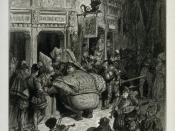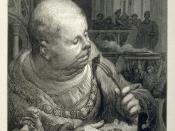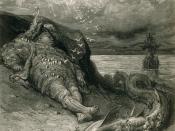Carnivalesque is a universal spirit of gaiety, laughter and festivity. As a genre of literature, it has particular features. Though the termÃÂcarnivalesqueÃÂ, a derivative from ÃÂcarnivalÃÂ, was invented by Mikhail Bakhtin, a Russian literary critic, in the twentieth century, the carnivalesque had its roots in ancient culture. He studied the features, images and sources of carnivalesque. On the example of ÃÂGargantua and PantagruelÃÂ by Rabelais Bakhtin showed how a work of literature can be carnivalised. The purpose of this paper is to prove on the basis of BakhtinÃÂs theory of carnivalesque that ÃÂBlack ObeliskÃÂ by Remarque is a sample of carnivalised German literature. ÃÂBlack ObeliskÃÂ is a novel about people living in Germany during inflation in 1923. The main characters of this book are Ludwig Bodmer, a worker of the monument firmÃÂ Heinrich Kroll & SonsÃÂ, his friends and brother-soldiers: Georg Kroll and Willy, and schizophrenic Isabelle. ÃÂBlack ObeliskÃÂ is a tragicomedy with the presence of ambivalent carnivalesque images like body and death and folk humor.
In the book ÃÂRabelais and his WorldÃÂ Bakhtin writes that the main features of carnivalesque are ambivalence, inversion of hierarchies, festivity, inclusion of all humanity and laughter that reduces and regenerates simultaneously.
One of the features of carnivalesque laughter, according to Bakhtin, is its ambivalence. Ambivalence is a possibility to understand things in different ways. Carnivalesque laughter is ambivalent: it is gay and at the same time mocking. It asserts and denies; buries and revives . There are a couple of images in the novel which should be looked upon from the point of view of ambivalence. Mostly, these images are connected with the lower strata of the body and death. One of them is the image of urine. This image debases and regenerates simultaneously. In ÃÂBlack ObeliskÃÂ Knopf, a former...


